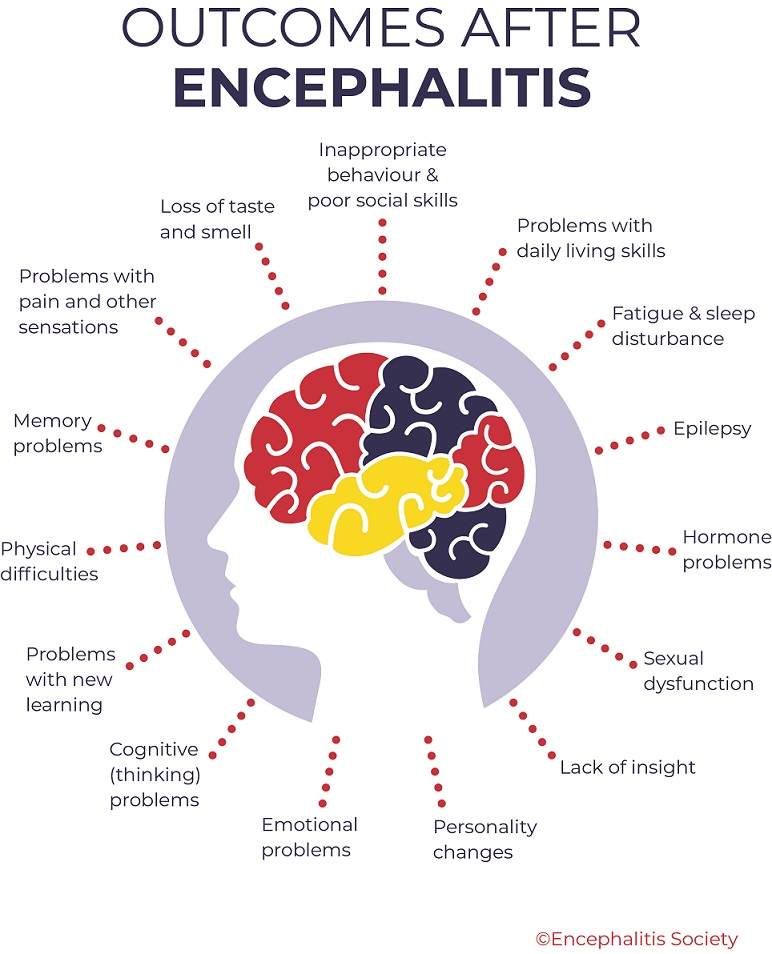The Journal of Neuropsychiatry and Clinical Neurosciences has published a new peer-reviewed study that uncovers a relationship between brain inflammation and depression.
The 7-year observational study found patients diagnosed with encephalitis had suicidal behavior and all patients suffered from psychosis. The researchers recommend suicide risk assessments in all patients diagnosed with Encephalitis. Suicidal behavior remitted completely in patients following immunotherapy.
One person is diagnosed with encephalitis every minute - a neurological condition that begins with flu-like symptoms, headaches and high temperatures. It's not clear what causes encephalitis but the brain inflammation is spread with common viruses, including COVID, and bacterial and fungal infections. Death rates are high when left untreated.
Dr. Ava Easton, CEO of Encephalitis Society and co-author of the study says their goal is to raise awareness of encephalitis to improve diagnose among patients.
“Mental health issues, self-injurious thoughts and suicidal behaviors following encephalitis may occur for a number of reasons and stigma around talking about mental health can be a real barrier to speaking up about symptoms, but it is an important barrier to overcome,” said Easton “This paper provides a platform on which to break taboo, show tangible links which are based on data between suicide and encephalitis and call for more awareness of the risk of mental health issues during and after encephalitis.”
Research from Encephalitis Society found that 77 percent of people around the world do not know what it is, resulting in delays in diagnosis, treatment, and poorer patient outcomes.
Symptoms of Encephalitis
Brigid Ward experienced flu-like symptoms back in 2015. It started as headaches and exhaustion where she felt lightheaded and weak.
“I drifted in and out of sleep, occasionally waking for sips of water or to use the bathroom. My fever continued to climb, and so did my lethargy,” she recalled to the Huff Post. “My sister, who is a nurse, made some calls, and soon after I was in an ambulance headed to the intensive care unit at the Hospital of the University of Pennsylvania. The doctors there believed I had a brain infection, so they treated me with antivirals. My brain was quickly inflaming, and I was hours away from slipping into a coma.”
What is Encephalitis?
Encephalitis is an often-devastating neurological condition that can leave survivors with permanent brain injury. Encephalitis can affect anyone irrespective of age, sex, or ethnicity. The symptoms of encephalitis can vary but can include flu-like illness, head-pain, drowsiness, uncharacteristic behaviour, difficulty controlling movements and speech, and seizures.
A different UK web-based study indicates that psychiatric symptoms following encephalitis are common. Despite the high rates, many respondents reported either that they had not been diagnosed with a mental health problem they felt that they had, and/or that mental healthcare provision following their encephalitis was inadequate.
The results highlight a need for increased provision of proactive psychiatric care for patients and increased research on mental health outcomes of encephalitis. The study was authored by Dr Thomas Pollak, of Kings College London, and colleagues.
Encephalitis Society
Encephalitis Society is a lifesaving, multi-award-winning charity and the leading global resource providing support and information, raising awareness of the condition, and collaborating in research. Since its launch in 2014, World Encephalitis Day has reached over 294 million people worldwide.
Encephalitis Society lead World Encephalitis Day on 22 February every year and urge people to wear red on the day and use #Red4WED on social media (visit www.worldencephalitisday.org to find out more and get involved).
You can follow the nonprofit on social media:
Twitter: @encephalitis
Instagram: @the_encephalitis_society_
LinkedIn: The Encephalitis Society
Facebook: The Encephalitis Society
TikTok: @encephalitissociety
Media Contact
Mark Macias
This email address is being protected from spambots. You need JavaScript enabled to view it.

